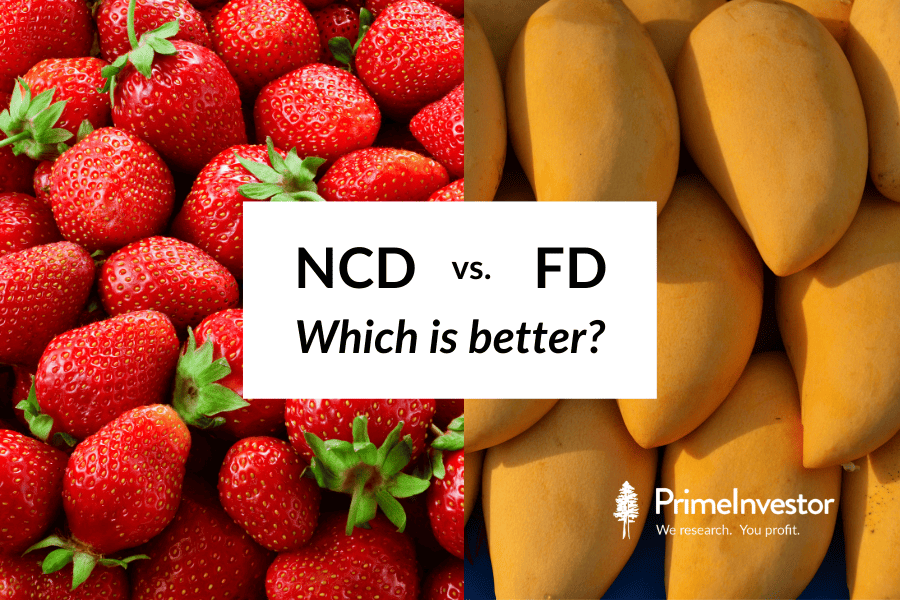With NBFCs, banks and other entities scrambling for funds, interest rates on debt instruments are shooting through the roof. Therefore, PrimeInvestor is getting a lot of queries on the lines of- “Should I prefer the Muthoot NCD offering 9.2% over the Shriram Finance FD offering 9.2%?”
This is a bit like asking if strawberries are better than mangoes 😊 When comparing two debt instruments, we need to assess the entity issuing it, its business risks, the tenor of the instrument, credit rating etc. individually. To really know if Muthoot NCDs or Shriram FDs are investment-worthy, you will need to analyse all these aspects for both instruments. We suggest you regularly track our Prime bond and NCD recommendations to spot good options.

But in this article on NCD versus FD, we’ll look at the more basic question of how FDs or fixed deposits compare to NCDs or non-convertible debentures in terms of safety, regulatory protection, liquidity, disclosure, collateral and other features.
Borrowers
If you look through the list of available NCDs on online bond platforms, you’ll find many unfamiliar names. This is because any company listed or unlisted, can choose to raise money through NCDs.
But FDs can only be raised by a select set of entities permitted by regulators. RBI allows all banks, but only specifically licensed deposit-taking NBFCs to raise FDs. The Ministry of Corporate Affairs (MCA) allows only public limited companies with a minimum net worth of Rs 100 crore and turnover of Rs 500 crore to accept public deposits, that too after Board and Registrar of Companies approval. In recent years, corporate FDs have dwindled in number and most of the available FDs are from NBFCs.
Tenor and rates
NCDs can be raised for any period of the company’s choice and there are NCDs in the market with tenors going up to 15 or 20 years.
Corporate FDs can only be raised for terms from 6 months to 3 years. RBI specifies that NBFC FDs can only be raised for 1-to 5-year terms. Interest rates on corporate or NBFC FDs cannot exceed 12.5% by law, while NCDs can be priced freely based on market interest rates and the issuer’s rating.
Company FDs, especially manufacturing FDs, are even more loosely regulated than NBFC FDs, with MCA keeping rather a tardy eye on funds raised through this route. Corporate history is littered with instances of companies defaulting on public deposits including well-known names such as Unitech. Depositors have limited recourse in the event of default on a company or NBFC FD.
How regulated
RBI regulates FDs raised by banks and NBFCs. MCA regulates FDs when they are raised by companies.
Of the various types of FDs, bank FDs are the most strictly regulated with RBI keeping a hawk eye on any whiff of default. However, FDs with co-operative banks can still be risky. Whenever RBI perceives the risk of default by a co-operative bank, it steps it to restrict withdrawals by depositors pre-emptively. It therefore makes sense for investors to stick to FDs from scheduled commercial banks, including small finance banks, while avoiding co-operative banks.
Bank depositors have the comfort of deposit insurance cover of up to Rs 5 lakh per accountholder. This cover includes all of the accountholder’s balances with the banks – savings account, current account and deposits – and does not exclusively apply to FDs. NBFC FDs do not have any such protection.
In NBFC FDs, the main protection to depositors is that RBI can cancel the NBFC’s license to do business in the event it defaults. While this serves as a deterrent to more god-fearing NBFCs who take deposits, it does not always prevent default, as we saw in the case of Dewan Housing Finance Limited (DHFL).
Company FDs, especially manufacturing FDs, are even more loosely regulated than NBFC FDs, with MCA keeping rather a tardy eye on funds raised through this route. Corporate history is littered with instances of companies defaulting on public deposits including well-known names such as Unitech. Depositors have limited recourse in the event of default on a company or NBFC FD.
NCDs being capital market instruments are regulated by SEBI. Unlike bank deposits, NCDs have no insurance protection. But investor interests in NCDs are overseen by debenture trustees. Usually, as NCDs have both retail and institutional buyers, defaults tend to get immediately reported and escalated to the Courts by institutional investors. With corporate FDs, it can become difficult for depositors to band together and represent their interests to the Court. Therefore, between corporate/NBFC FDs and NCDs, the latter are better regulated.
Disclosures
NCDs offer better disclosures both at the time of issue and on an ongoing basis, to investors on the health of the issuer.
At the time of issuing NCDs, companies are required to file a detailed offer document with the company’s business, history, financials over the years, risk factors, features of the instrument, security cover and enclose a copy of the latest credit rating report. If you invest in listed NCDs, the company will also need to update you on the changes to the business even after your investment via stock exchange filings. NCD issuers need to make prompt statutory filings with the stock exchanges on their results, changes in credit ratings, material events and any default or delay in interest or principal repayments.
In the case of FDs, there are no specific disclosures made at the time of your investment. It is up to you to research the NBFC accepting the deposit. Companies are required to publish newspaper ads soliciting deposits, but these ads are sketchy. After your deposit is made, the NBFC or company raising the FD has no obligation to keep you informed of its financial position or credit rating. You will therefore need to keep track of these metrics on your own, until your deposit matures.
Legal status
NCDs can be secured or unsecured. With secured NCDs, there is a collateral backing the bond that can be liquidated if the company defaults. Secured NCDs give their holders a better shot at realising some money if the company defaults, than FDs. FDs rank as unsecured debt of the company.
When a company defaults on its obligations, what investors will get is decided by the waterfall mechanism specified by law (What’s that? Read our earlier primer on NCDs: Deep dive into bond market jargon. In this waterfall mechanism, secured NCDs rank much higher than FDs, within financial creditors.
In the DHFL case, when the company defaulted and was dragged before the insolvency Courts by lenders, Courts ruled that DHFL FD holders would not get any special treatment and would be treated as unsecured financial creditors under the waterfall mechanism. DHFL FD holders took a large haircut and finally received only 23 per cent of their invested amounts. Holders of secured NCDs in DHFL received a much better deal. Those with holdings upto Rs 2 lakh received 100% repayment of their principal as ‘retail’ investors, while those with holdings above Rs 2 lakh got 46% of their principal back.
Early exit
FDs may or may not offer premature exit to the investor once locked into a specific term. Some companies/NBFCs/banks do offer premature exit to the investor, but levy a penalty amounting to say 0.5% or 1% to allow such exits. Some offer higher rates on deposits without any early exit option. Whether you will be allowed to exit early from a FD and the sacrifice you will make when you do so, is well-known when you invest in a FD.
In a NCD, early exit may be trickier. NCDs can be listed or unlisted. In unlisted NCDs, early exit is close to impossible unless the debt dealer is able to offload it for you. In listed NCDs too, your exit is a function of the trading volumes in that particular NCD as bond markets in India are not very liquid. As the traded value of a NCD in the market is subject to daily movements based on interest rate swings and perception of the issuer, it is hard to predict the price at which you may get to exit the NCD prematurely.
Traceability
When you make any financial investment, it helps if it is convenient to track for yourself and your heirs. Listed NCDs which figure in your demat account and CAS statements are easier to track and trace both for yourself and your dependents in your absence than FDs, where you may lose sight of the FD receipt.
Taxation
Interest income from FDs is simply added to your income for the relevant year and taxed at your slab rate. There is no concept of capital gains or losses on FDs as you hold them till maturity.
Interest from NCDs is subject to similar treatment. But as NCD prices can move above or below your buy price in the secondary market, capital gains taxation is applicable to gains or losses on NCDs if you exit them through markets, before maturity. On unlisted NCDs, the holding period to decide if gains are long-term is 36 months. Long term gains are taxed at 20% and short term at slab rates. For listed NCDs, the holding period to determine long-term capital gains is 12 months. Long term capital gains are taxed at 10% and short term at slab rates. (For more details on NCD taxation, read our article – How are G-Secs and bonds taxed.)
NCD versus FD – Takeaways
In summary, investors should choose between NCDs and FDs in the following way:
- In terms of safety of capital, bank FDs are the safest. Secured listed NCDs come next, followed by NBFC FDs and corporate FDs, in that order.
- NCD holders enjoy better legal status than FD holders in the event of default by a company or NBFC.
- If you need to research the entity you’re investing in, NCDs offer more disclosures for you to do this, both at the time of investment and after.
- In any debt instrument, the management, reputation and integrity of the taker of debt takes precedence over every other factor. Therefore, whatever the legal position, a FD from say a Sundaram Finance will always be safer than a secured NCD from a less-known NBFC.
- If you’re investing in non-bank FDs, stick to AAA entities of unquestioned repute, as you do not have much regulatory protection otherwise.








10 thoughts on “NCD versus FD: Which is better?”
Hello PrimeInvestor team
Muthoot fincorp ncd ipo series 12 should we subscribe ? Please let us know your advice. Thanks.
In future, kindly avoid recommendation related questions over blog and write to us using contact us so that we can track and respond better. What time period are you looking at in it? If youa re going for 3 years or less with payout then fine.
From my experience, I can say that the instrument is secondary. The company and the promoters are the only thing that matters. As Aarati said, there is Sundaram Finance and then there are NBFCs. The chase for higher returns is what dilutes credit quality. Credit rating plus name recognition, both are important.
Thanks for the detailed write up. While considering NCD investments, credit rating is a major factor that sways ones decision. Off late have been wondering about the rating integrity of credit rating agencies. Apart from CRISIL & ICRA quite a few have come up. An assessment from Prime Investor would be helpful.
Thanks
Not sure which rating agency you specifically mean. There aren’t new ones. In fact regulator closed the license for one (Brickworks) in 2022. Of the lot, Crisil and ICRA are popular and smaller companies and rated by mostly CARE, Fitch, Acuite, India Ratings. There may be one or two smaller ones other than this. The biggest defaults have happened with the biggest rating agencies as well 🙂 But in general, CRISIL and ICRA often withdraw ratings if disclosure is poor or they are worried. So that may be a flag. Whether small or large rating agency, we would think rating is one of the criteria not the primary one. The debt servicing capability, their ability to handle credit down phases and balance sheet strength definitely needs assessment in any issue apart from credit rating.
Thanks for the information.
Thanks for the informative article. It will help in selecting, and more important, not selecting the right option.
A couple questions:
1. How is the cap of 12.5% on the ROI on corporate or NBFC FD’s arrived at? Does it change with the interest rates or is it fixed?
2. Will the deposit insurance apply to the surplus parked in a home loan overdraft account, like the SBI maxgain?
The cap is just a flat regulatory cap applied by RBI that doesn’t change with rates. Yes I do think it will apply.
While you have rated NCD better than the FD’s. but even NCD’s are under default. Case in question is SREI Equipment Finance / SREI Infra that was referred to IBC. Even NCD holders under DHFL lost their money and they were all rated AAA and secured,. Though the law is in place, still there is long way to go even when there are IBC proceedings. I recently got refund of principal of DCM financial NCD invested in 1996 . I would personally say that stay away from these rated instruments. I endorse Sundaram Finance FD is better than any of these NCD’s as pointed in your article
Yes NCDs can see defaults too. The company borrowing makes all the difference, as you point out.
Comments are closed.